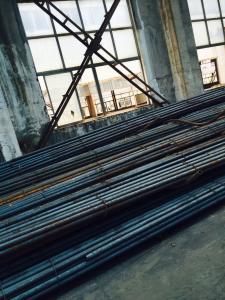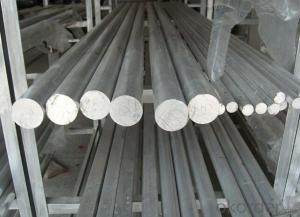52100 Bearing Steel Rounds Hot Rolled Treatment
- Loading Port:
- Tianjin
- Payment Terms:
- TT OR LC
- Min Order Qty:
- 25 m.t.
- Supply Capability:
- 50000 m.t./month
OKorder Service Pledge
OKorder Financial Service
You Might Also Like
Item specifice
52100 Bearing Steel Rounds Hot Rolled Treatment
Product Description:
Material | suj2 | ||
Chemical Composition | Mechanical Properties(In Quenched & Tempered State) | ||
C | 0.95-1.05 | Tensile strength(MPA) | ---- |
Si | 0.15-0.35 | Yield strength (MPA) | -- |
Mn | 0.25-0.45 | Elongation(δ5/%) | -- |
Cr | 1.40-1.65 | Reduction in Area (ψ/%) | -- |
Mo | ≤0.10 | Impact (J) | -- |
P | ≤0.025 |
Hardness | HB170-207 HB207-229 HB270-390 HB229-285 HRC62-66 HRC61-66 HRC≈67 |
S | ≤0.025 | ||
Ni | ≤0.30 | ||
Cu | ≤0.25 | ||
Ni+Cu | ≤0.50 | ||
Characteristics:
1) Good hardability and high toughness
2) Long fatigue life
3) Medium cold processing plasticity
4) Certain machinability
5) Poor weldability
Application:
1) Steel ball, roller and collar of large machinery bearing
2) High-hardness and high contact fatigue strength machinery parts with heavy load, such as axis of rotation, blade, stator pump, profiling, sleeve, mandril, etc.
Photos of our products:
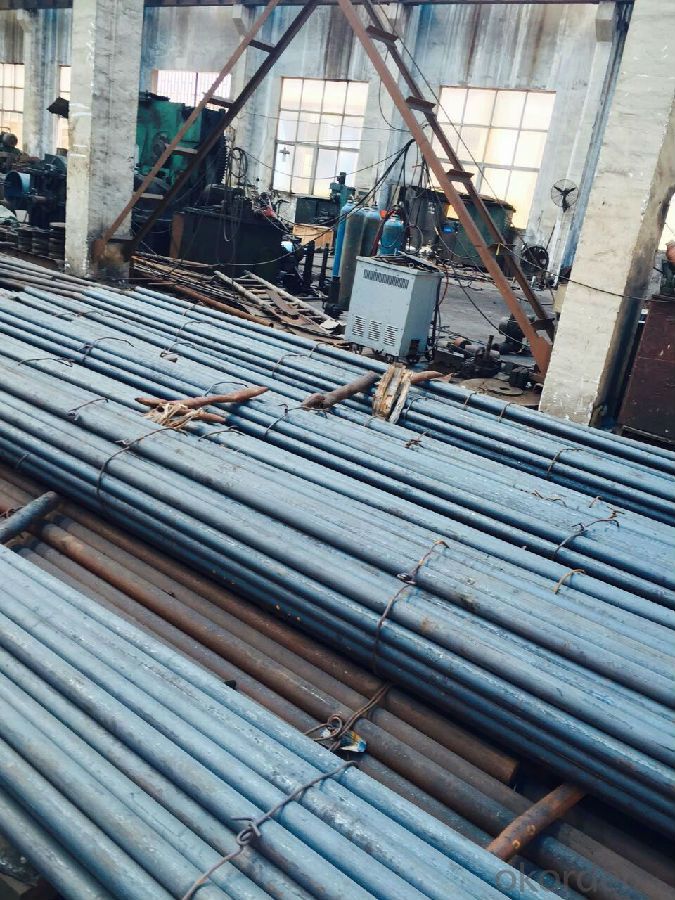
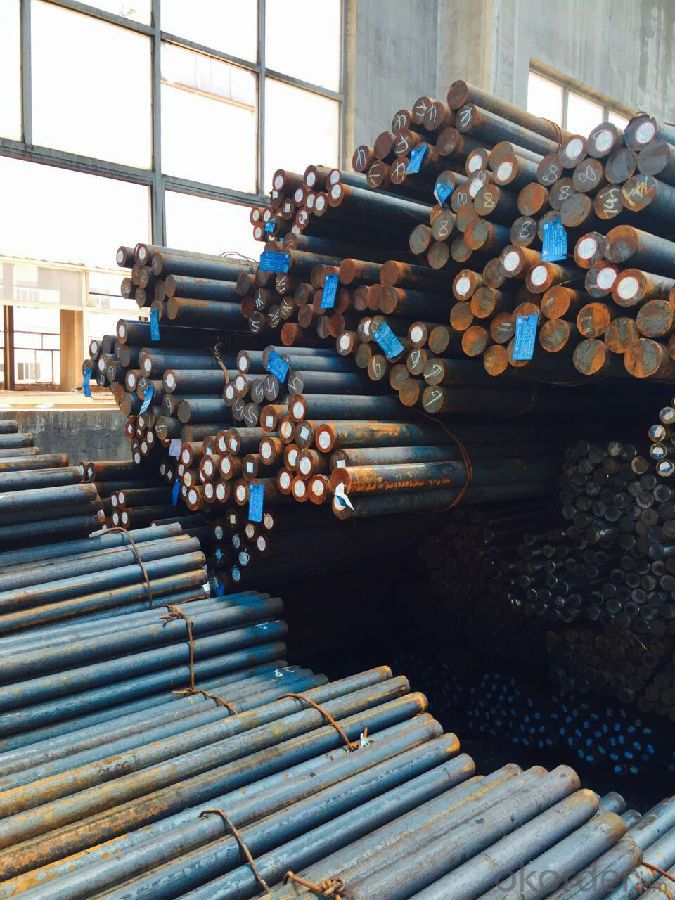
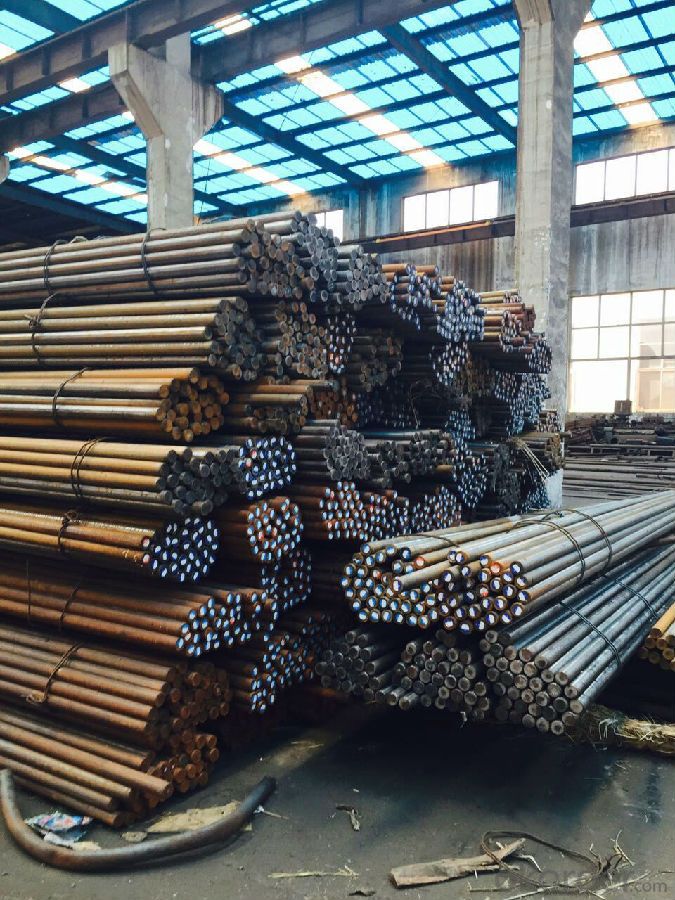
- Q:How does special steel perform in marine environments?
- Special steel performs exceptionally well in marine environments due to its high corrosion resistance. It is specifically designed to withstand the harsh conditions of saltwater, preventing corrosion and ensuring long-term durability. Additionally, special steel has excellent strength and toughness properties, making it suitable for various marine applications, such as shipbuilding, offshore structures, and underwater equipment.
- Q:What are the different heat-resistant grades of special steel?
- There are several heat-resistant grades of special steel that are specifically designed to withstand high temperatures and thermal stress. Some of the commonly used heat-resistant grades include: 1. Stainless Steel 310: This grade of stainless steel is known for its excellent resistance to high temperatures, oxidation, and corrosion. It can withstand temperatures up to 1100°C (2012°F) and is often used in furnace parts, heat treatment baskets, and other heat-intensive applications. 2. Inconel 600: Inconel 600 is a nickel-chromium alloy that offers exceptional resistance to high temperatures and oxidation. It can operate effectively in temperatures ranging from cryogenic to 1093°C (2000°F) and is widely used in gas turbines, heat exchangers, and other high-temperature environments. 3. Hastelloy C-276: Hastelloy C-276 is a nickel-molybdenum-chromium alloy that offers excellent resistance to a wide range of corrosive environments and high temperatures. It can withstand temperatures up to 1093°C (2000°F) and is commonly used in chemical processing, power generation, and pollution control applications. 4. Titanium Grade 2: Titanium Grade 2 is a commercially pure titanium alloy that exhibits good resistance to high temperatures and corrosion. It can operate effectively in temperatures up to 538°C (1000°F) and is often used in heat exchangers, chemical processing equipment, and marine applications. 5. Alloy 617: Alloy 617 is a nickel-chromium-cobalt-molybdenum alloy that offers exceptional strength and resistance to high-temperature environments. It can withstand temperatures up to 1204°C (2200°F) and is commonly used in gas turbines, petrochemical plants, and other heat-intensive industries. These are just a few examples of the heat-resistant grades of special steel available in the market. The selection of the appropriate grade depends on the specific temperature requirements, corrosion resistance, and mechanical properties needed for the application.
- Q:How does special steel perform in dynamic loading conditions?
- Thanks to its high strength, toughness, and fatigue resistance, special steel excels in dynamic loading scenarios. When exposed to repeated and fluctuating stresses, special steel can endure the impact and maintain its mechanical properties without any setbacks or distortions. The distinct composition and processing techniques employed in the production of special steel, including the addition of alloying elements and heat treatment, significantly bolster its ability to withstand dynamic loading. Consequently, special steel proves to be an optimal material for applications that involve dynamic forces, such as automotive components, machinery parts, and structural elements utilized in construction. The exceptional performance of special steel under dynamic loading conditions guarantees durability, reliability, and safety across various industries.
- Q:How does special steel perform in terms of thermal expansion?
- Special steel typically performs well in terms of thermal expansion. It has a low coefficient of thermal expansion, meaning it expands and contracts less with temperature changes compared to other types of steel. This makes it more dimensionally stable and less prone to warping or distortion when exposed to heat or cold.
- Q:What are the requirements for special steel used in aircraft manufacturing?
- The requirements for special steel used in aircraft manufacturing are quite stringent due to the critical nature of the components and the demanding operating conditions in which they are subjected. Here are some key requirements: 1. High strength: Special steel used in aircraft manufacturing must possess exceptional strength to withstand the extreme forces and loads experienced during flight. This ensures the structural integrity and safety of the aircraft. 2. Lightweight: While strength is crucial, special steel for aircraft must also be lightweight to minimize the overall weight of the aircraft. This helps enhance fuel efficiency and allows for increased payload capacity. 3. Corrosion resistance: The steel must exhibit excellent resistance to corrosion, as aircraft are often exposed to harsh environments, including high humidity, saltwater, and various chemicals. Corrosion resistance helps maintain the structural integrity and prolong the lifespan of the aircraft. 4. Fatigue resistance: Special steel must have high fatigue resistance to withstand repetitive loading and unloading cycles that occur during flight. This ensures that the components do not fail prematurely due to cyclic stress. 5. Heat resistance: The steel should be able to withstand high temperatures generated by the engines, as well as the heat generated during high-speed flight. Heat resistance prevents deformation, melting, or loss of strength under extreme thermal conditions. 6. Weldability: Special steel used in aircraft manufacturing should possess good weldability, allowing for efficient and reliable joining of components during the manufacturing process. This ensures strong and secure connections between various parts of the aircraft. 7. Non-magnetic properties: In certain applications, such as electronic systems, it is essential for the steel to be non-magnetic to prevent interference with sensitive equipment. 8. Traceability and certification: The steel must have proper traceability and certification to meet industry standards and regulatory requirements. This includes documentation of the steel's composition, manufacturing process, and testing procedures to ensure consistent quality and performance. Meeting these requirements is essential to ensure the safety, reliability, and efficiency of aircraft. Special steel used in aircraft manufacturing undergoes rigorous testing, quality control, and certification processes to ensure it meets these stringent requirements before being used in the construction of aircraft components.
- Q:How is high-temperature alloy steel used in the production of heat exchangers?
- High-temperature alloy steel is commonly used in the production of heat exchangers due to its exceptional corrosion resistance, high strength, and ability to withstand extreme temperatures. It helps in maximizing the efficiency of heat transfer by maintaining structural integrity and preventing any degradation caused by the harsh operating conditions.
- Q:Can special steel be used in the oil and gas industry?
- Yes, special steel can be used in the oil and gas industry. Special steel alloys such as stainless steel, duplex steel, and super duplex steel are widely utilized in various applications within the industry due to their exceptional corrosion resistance, high strength, and heat resistance properties. These specialized steels provide increased durability and performance in harsh environments, ensuring the safe and efficient operation of oil and gas equipment and infrastructure.
- Q:How is wear-resistant steel used in mining equipment?
- Wear-resistant steel is commonly used in mining equipment due to its high durability and strength. It is utilized in various applications such as excavator buckets, crusher liners, and conveyor parts to withstand the harsh conditions of mining operations. The wear-resistant properties of this steel help to minimize abrasion and extend the equipment's lifespan, resulting in increased productivity and reduced maintenance costs.
- Q:Can special steel be used in the telecommunications industry?
- Yes, special steel can be used in the telecommunications industry. Special steel, such as stainless steel or corrosion-resistant steel, can be utilized for various applications in telecommunications infrastructure, including tower structures, antenna components, cables, and connectors. These types of steel offer high strength, durability, and corrosion resistance, ensuring reliable and long-lasting performance in the telecommunications sector.
- Q:What are the main characteristics of creep-resistant steel?
- Creep-resistant steel is a type of steel that exhibits high resistance to creep, which is the deformation that occurs under prolonged exposure to high temperatures and stress. The main characteristics of creep-resistant steel include: 1. High temperature resistance: Creep-resistant steel is capable of withstanding extremely high temperatures without significant deformation. This is crucial in applications where the material is exposed to elevated temperatures for an extended period of time, such as in power plants, boilers, and gas turbines. 2. Strength and toughness: Creep-resistant steel has excellent mechanical properties, including high tensile strength and toughness. This allows the material to withstand the stress and pressure that it is subjected to, even at high temperatures. 3. Resistance to corrosion and oxidation: Creep-resistant steel is often alloyed with elements such as chromium, molybdenum, and nickel, which enhance its resistance to corrosion and oxidation. This makes it suitable for use in aggressive environments where exposure to moisture, chemicals, and gases is common. 4. Dimensional stability: Creep-resistant steel exhibits minimal dimensional changes even under prolonged exposure to high temperatures and stress. This means that the material retains its shape and size, ensuring the integrity of the structure or component it is used in. 5. Longevity and durability: The combination of high temperature resistance, strength, and corrosion resistance makes creep-resistant steel highly durable and long-lasting. This reduces the need for frequent maintenance and replacement, improving the overall efficiency and cost-effectiveness of applications that rely on this material. Overall, creep-resistant steel is specifically designed to withstand the challenging conditions of high temperatures and stress, making it a preferred choice in industries where reliability and safety are paramount.
1. Manufacturer Overview |
|
|---|---|
| Location | |
| Year Established | |
| Annual Output Value | |
| Main Markets | |
| Company Certifications | |
2. Manufacturer Certificates |
|
|---|---|
| a) Certification Name | |
| Range | |
| Reference | |
| Validity Period | |
3. Manufacturer Capability |
|
|---|---|
| a)Trade Capacity | |
| Nearest Port | |
| Export Percentage | |
| No.of Employees in Trade Department | |
| Language Spoken: | |
| b)Factory Information | |
| Factory Size: | |
| No. of Production Lines | |
| Contract Manufacturing | |
| Product Price Range | |
Send your message to us
52100 Bearing Steel Rounds Hot Rolled Treatment
- Loading Port:
- Tianjin
- Payment Terms:
- TT OR LC
- Min Order Qty:
- 25 m.t.
- Supply Capability:
- 50000 m.t./month
OKorder Service Pledge
OKorder Financial Service
Similar products
New products
Hot products
Hot Searches
Related keywords

